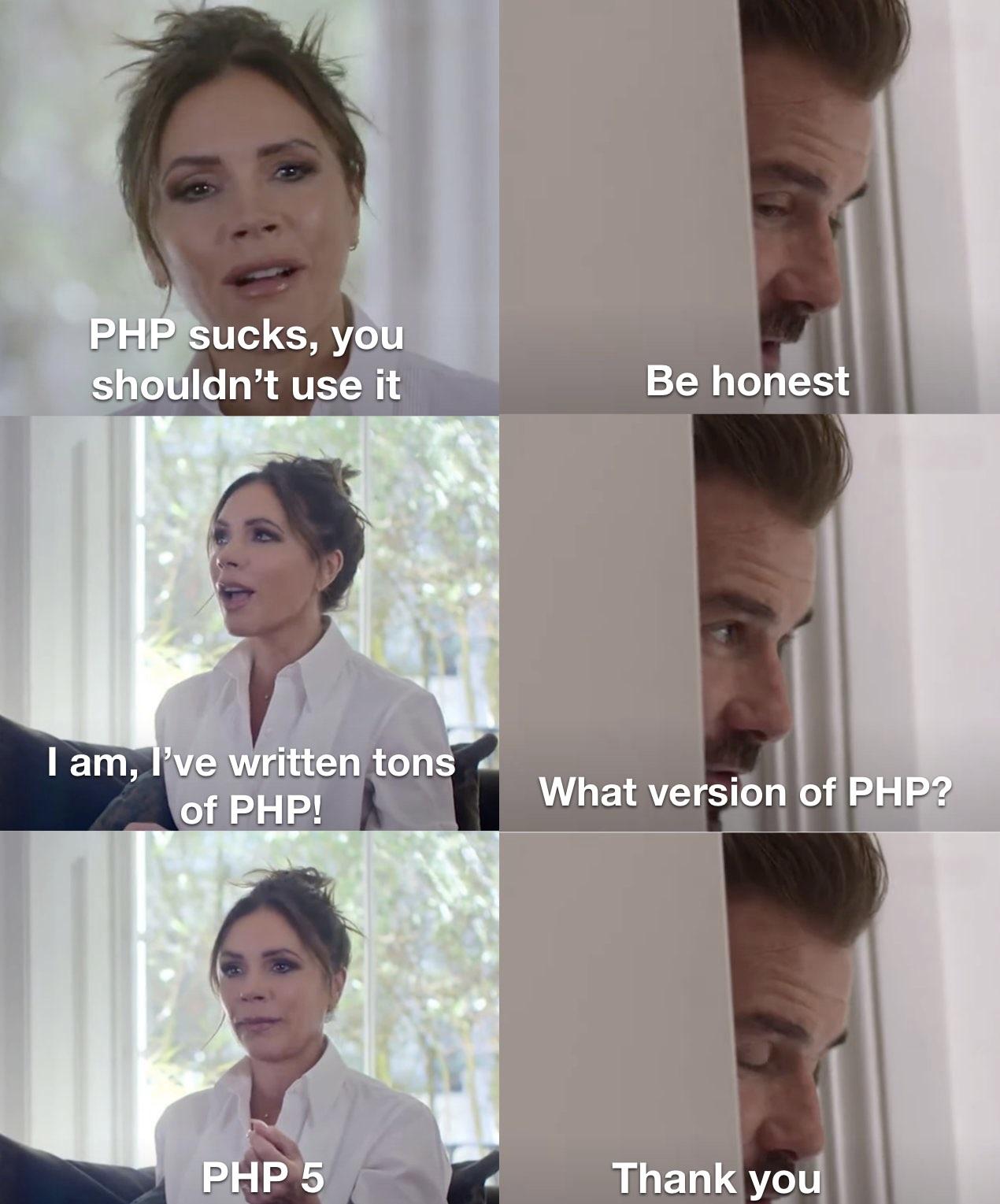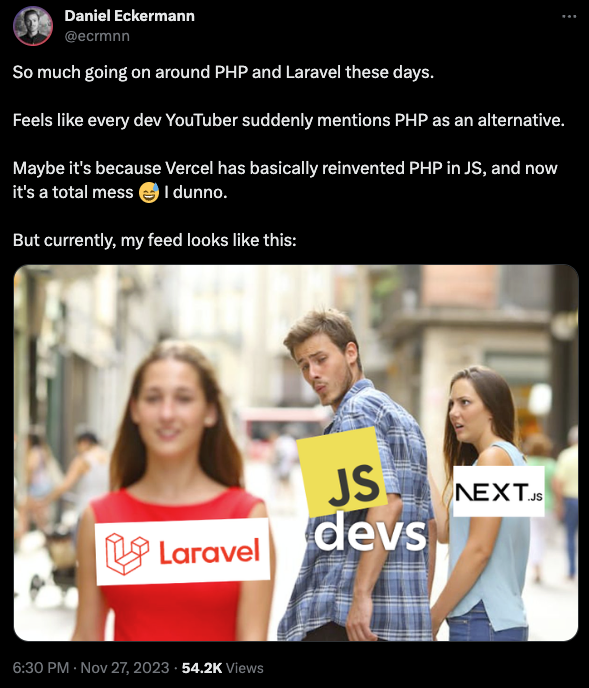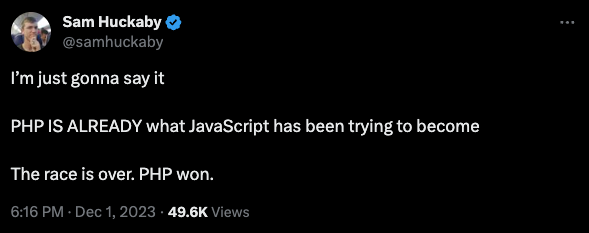Why Laravel Could See a Huge Rise in Adoption in 2024
Published: 1 year agoI think the Laravel ecosystem is poised to explode in 2024. This has huge potential for experienced Laravel engineers, the ecosystem and the community as a whole, not just for 2024 but for years to come.
How'd you figure?
There are a number of factors at play:
- Laravel's growth and non-stop excellence
- Tech layoffs are continuing
- Other corporate cost-saving exercises
- Fatigue with the state of other popular languages and frameworks
Let's go into a bit more detail on each of these areas.
Laravel's growth
Firstly, the framework itself recently crossed 300M downloads, which is huge.
Its benevolent dictator is kinda rewriting the script on how to do bootstrapped open source at this scale and has already hinted at some big growth happening at Laravel, LLC in 2024.
Taylor has even gone on record - multiple times - stating that the Core Laravel team is going to grow this year, probably close to doubling in size, mainly to support the premium products: Forge, Envoyer, and Vapor.
That's a strong signal of growth of the ecosystem but also a sign of investment in these tools, which is usually aligned with a drive to keep existing customers happy (by keeping on par with/ahead of competitors) and grow the customer base. So this is a good sign.
Laravel also has an amazing, helpful and positive global community that is seeing massive growth. This year there are no fewer than four headline Laravel conferences: Laracon EU, Laracon India, Laracon US, and Laracon Australia!
Plus the more community-led Laravel Live UK, and Laravel Live DK, besides online events such as the Laravel Worldwide Meetup.
And Laravel 11 is just around the corner, along with Laravel Reverb.
Laravel 11's main focus seems to be on making the initial setup of the framework less daunting for folks who are new to trying it out.
Expect this to come with refreshed content from the likes of Laracasts (this is an affiliate link), Codecourse and many other online Laravel educators too, further expanding the framework's accessibility.
And Reverb brings a significant piece of kit (WebSockets & real-time) that's been missing from the Laravel ecosystem, and puts it right into the hands of Laravel developers with what looks to be a really solid, simple-to-install-and-run implementation.
Laravel Herd is also going to be available for Windows next month! 🤯
And the first- and third-party tooling is already off the charts:
And not to forget that some of the best companies and SaaS products today are building at massive scale on Laravel:
- LemonSqueezy
- Fathom Analytics
- Even OpenAI are running on Laravel!
And this doesn't even scratch the surface!
Honestly, if you can't feel the buzz around Laravel right now, it's time to plug in again. Something is in the air, something big!
Continued layoffs
According to public data provided by layoffs.fyi, tech layoffs have stayed at a pretty steady level for the past 6 months or so, hovering around the levels we saw at the beginning of the global economic downturn in mid-2022.
In January 2024 so far, there have already been 61 companies laying off almost 10,000 employees (note that not all of those will be engineering roles).
That said, there are some positive signs for 2024, as the FAANG corporations show signs of bringing hiring back.
As we know, there's a huge wake caused by these giant whales and it usually takes a little while for the market to catch up. While these companies might show signs of getting back to prior hiring activity, smaller companies and startups are likely to take longer to get back on the hiring wagon.
What does this mean for Laravel?
Right now, the market is saturated with engineers looking for work, which creates both problems and opportunites.
On the one hand, more engineers looking for jobs means a lot more competition for interviews, down-leveling attempts by hiring managers and stagnant compensation offers by compensation committees.
While that makes getting a foot in the door for interviews harder, it also makes offers when they do come less attractive. This has historically had the effect of pushing many engineers (and folks with other skills) towards freelancing or even building their own products/startups. I suspect this is already happening.
And this is where Laravel shines. It's certainly not the only option, but considering how quickly and cost-effectively you can start building a digital product with Laravel, there's a good chance that a high percentage of the new products we see over the coming months will use it as a base.
For those of us already familiar with Laravel, this presents opportunities as these new businesses look to build prototypes, MVPs and websites.
Cost-savings & reducing risk
Layoffs aren't the only cost-saving businesses will be looking at. Other big spend areas are often around hosting costs (especially for SaaS companies) and tax issues, e.g. Section 174 in the US.
This is turning many companies away from new subscription services and consolidating existing ones. If they can pay once and save a ton of money, maybe they will.
There's also the Return To Office (RTO) movement. Despite hilarious gaffs, the shift is happening. With workers keen to hold onto jobs, many will give into the pressure.
Businesses are obviously keen to maximize the value their office space investments, as well as to avoid duplicitous employees taking multiple secret roles or working across borders and creating permanent establishment and other legal and tax liabilities for the company.
As the motivations and justifications may not always be clear or fair, this is going to create further staff turnover.
What does this mean for Laravel?
Again this is going to push some towards going it alone. They may even take some of the frustrations they see in their industry or problems they saw customers of their prior employers experiencing and create innovative solutions in Laravel, turning out killer products.
With the anti-subscription sentiment getting stronger both for businesses and consumers, could we see building one-time-purchase products rise again?
Tools like NativePHP (full disclosure: I'm one of the maintainers of NativePHP) are making using Laravel to build these products easier than ever.
Using Laravel at scale, however you choose to deploy it, is an incredibly efficient choice. The story is so good, even very small teams can build and manage products with it.
Fatigue
If you spend any time at all on tech Twitter, everywhere you look it seems like you see cracks in the React/Javascript/Typescript community about something or other.
Whether it's passive-aggressive commentary on the rapid rate of change or the meme culture that seems to be hyping tools like HTMX, Alpine, and Astro, devs and teams seem to be getting a bit fed up of how wildly their tech of choice has been swinging in recent months.
Sure, this isn't peculiar to the JS community, but it seems to be the most common of late.
Of course, you can use React and Laravel together. It's a great way to build scalable apps when that's what you need.
But when everything else in the world is going at a million miles per hour and you just want something to stay stable, Laravel's got your back.
What does this mean for Laravel?

And PHP 8.3 has brought another round of significant speed improvements with it.
On top of this we're seeing the #NoBuild "movement" happening. I'm not 100% on this, but in many ways Laravel's already there with tools like Livewire and Curlwind.
In the past few months, we've seen quite a few well-known names in the JS community reflect positively on PHP's stability (and eerie similarity to some of the tech that's starting to appear in JS-land), and Laravel and its cohesive ecosystem of tooling.
Here's a collection of some of my favorite recent tweets:
 (@kapehe_ok and this one)
(@kapehe_ok and this one)
 (@ecrmnn)
(@ecrmnn)
More:
Considering all of this, hopefully you can see why I think Laravel might be on the cusp of some exceptional growth this year. Of course, this is just my opinion and there are plenty of other great choices out there, but Laravel's opinionated approach and focus on the web platform is making it a force to be reckoned with!

Simon Hamp
I run Laradevs. I'm a long-time Laravel developer and I love helping other Laravel devs to excel.
Follow me on 🦋 (
(